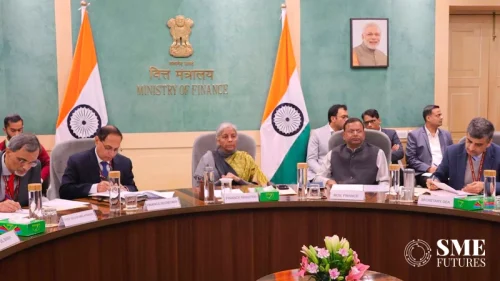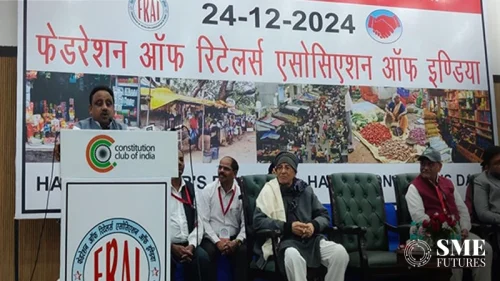In the ever-evolving landscape of India’s tech sector, resilience is the key that unlocks growth, defying macroeconomic tides and global slowdowns. While the world held its breath with a modest 4.4 per cent uptick in tech spending in CY2023, India’s tech sector stood firm, refusing to merely follow trends but daring to set its own trajectory.
Deloitte Tech Trends Report 2024, projects the roadmap to exceeding expectations surpassing the mundane to reach a staggering US$254 billion in the fiscal year 2024. That’s not just growth; it’s a revolution, a testament to the indomitable spirit of India’s tech prowess.
But amidst the triumphs lie the trials, the hurdles that add spice to the narrative. India, known as the third-largest tech startup ecosystem, is no stranger to challenges. From cybersecurity vulnerabilities to talent shortages, stakeholders across the sector offer their perspectives on navigating the complexities of the technological terrain.
In confronting these common challenges, India’s tech sector can harness its resilience and innovation to propel itself towards sustained growth and global leadership in the digital era.
Cybersecurity vulnerabilities in tech sector
While India’s tech startup ecosystem continues to thrive, it’s essential to address the multifaceted challenges that impact tech industry’s success. One such challenge lies in the convergence of cybersecurity vulnerabilities with macroeconomic headwinds and heightened geopolitical tensions, points out Kumar Ritesh, CEO and Co-Founder of Cyfirma.
According to IBM study, there is surge of 32 per cent in incidents of data theft and leak in the organisations, indicating more groups are favoring this method to obtain financial gains.
“As businesses navigate through economic uncertainties and geopolitical complexities, cybersecurity threats become even more formidable. In addition to traditional cyber threats, emerging technologies like generative AI and deepfakes further compound the cybersecurity landscape, posing novel challenges for startups and enterprises alike. The proliferation of deepfake technology, for instance, raises concerns about misinformation, identity theft, and reputational damage, underscoring the importance of robust cybersecurity measures and threat intelligence,” he explains.
Addressing these challenges requires a collaborative and proactive approach from all stakeholders. He recommends tech startups to prioritise cybersecurity as a core component of business strategy, integrating advanced security solutions and best practices to safeguard against evolving threats.
Furthermore, fostering collaboration and knowledge-sharing within the industry can help build resilience and adaptability in the face of emerging risks.
Start building solutions for Bharat
Technology is transforming the way in which these consumers access products & services, irrespective of the field its being used.
“Given India’s size and resource restrictions, low-cost, high-impact solutions are necessary, points out, Satish Shukla, Co-Founder of Addverb. “Because of their capacity to scale and grow exponentially, technology startups play an important role in achieving this goal,” he says.
Another stakeholder from the retail sector, Sameer Gandotra, Chief Executive Officer at Frendy emphasises the omnipresence of technology and the role it plays in economic wellbeing, especially for the next half billion consumers living in our towns & villages, is important.
“Digitally driven supply chains, in-store use of IoT & ML for consumer data & insights, digital marketing, and omnichannel fulfillment, all have the potential to give a “better daily shopping experience” to these consumers. However, there are a lot of nuances that need to be kept in mind while building for Bharat!,” he says.
According to him, the solutions need to be built in a way that suits these consumers, at their pace and their preferences.
“Acknowledging minor nuances, like low-bandwidth connectivity & handholding with digital payments, goes a long way in building trust with these consumers!” he elaborates.
Navigating the complex supply chain terrain
Another significant hurdle that tech companies face lies in navigating the complexities of establishing a robust supply chain, particularly when developing high-voltage technology.
Dinesh Arjun, Co-Founder and CEO at Raptee talks about it. “This challenge arises from the intricate nature of integrating multiple subsystems and the demand for constant innovation, often amidst constraints in resources. The process demands meticulous planning, precise execution, and a profound understanding of technological intricacies to ensure the reliability and efficiency of the final product,” he says.
The task of forging a dependable and efficient supply chain poses a formidable obstacle. Moreover, as a supply chain grows in complexity, the seamless flow of information and knowledge can be disrupted, resulting in heightened costs and risks. This, in turn, can impede a firm’s capacity to gain critical insights, thus adversely impacting its Integrated Business Planning (IBP) efforts.
Arjun says, persuading suppliers, especially those accustomed to traditional Original Equipment Manufacturers (OEMs), to collaborate with technology firms can be daunting. “It necessitates demonstrating unwavering commitment to quality, consistency, and longevity in the market, thus showcasing these companies as serious contenders capable of delivering cutting-edge high-tech solutions,” he says.
Sector grappling with talent shortage
One of the largest obstacles hindering the success of talent companies is the acute shortage of talent. Despite the abundance of brilliant minds and burgeoning aspirations, the dearth of skilled professionals poses a formidable barrier to realising full potential.
While India boasts a robust pool of tech talent, it has the lowest tech talent demand-supply gap at 25 to 27 per cent among global tech leaders such as the USA, UK, Canada, and Australia according to a study titled ‘India Tech Industry Digital Talent Demand and Supply Analysis 2023’ by Nasscom.
Vedant Hamirwasia – Director, ODA Class highlights that the demand for specialised expertise in fields ranging from artificial intelligence to cybersecurity exceeds the available supply, creating a palpable imbalance that threatens to stifle innovation.
“Innovation thrives on the synergy of diverse perspectives and the brilliance of capable hands. However, the talent shortage not only restricts the pace of development but also undermines the competitive edge of technology firms on the global stage. Without a robust pool of skilled professionals to draw from, companies grapple with the daunting task of scaling operations, navigating complex technological landscapes, and sustaining momentum in an ever-competitive market,”
Satish Shukla, Co-founder of Addverb opines the same highlighting, there’s fierce competition among companies to attract and retain skilled professionals.
“This scarcity of talent not only drives up employee costs but also hampers innovation and growth potential. Additionally, rapid advancements in technology demand continuous upskilling and reskilling of employees, further exacerbating the talent crunch. Without access to a steady stream of qualified personnel, companies struggle to scale their operations, develop cutting-edge solutions, and stay competitive in the global market,” he says.
Both of them believe addressing the talent shortage demands a concerted effort from all stakeholders – from policymakers to educators, from industry leaders to aspiring professionals.
Hamirwasia emphasises investing in education, fostering collaborative ecosystems, and nurturing talent pipelines are imperative steps toward surmounting this obstacle. “Only by empowering the next generation of innovators and cultivating a culture of continuous learning can we unleash the full potential of India’s tech startup ecosystem and chart a course toward a future defined by boundless innovation and prosperity.” he says.











